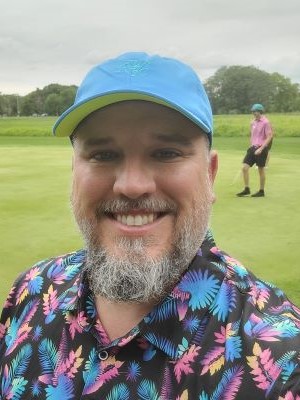
Sean Sullivan
RADIATION THERAPY TECHNOLOGY
Graduated in 2004
Therapeutic Radiation Technician
John D. Dingell VA Medical Center
Q: Why did you choose Wayne State University?
A: I knew I wanted to study Radiation Therapy Technology (RTT) and Wayne State offered a bachelor’s degree in RTT. Additionally, I thought Wayne had a great campus setup and it was convenient to continue working while going to school. I also received a scholarship – attending Wayne State was an easy decision!
Q: What inspired you to pursue Radiation Therapy Technology?
A: I had several family members and friends of the family who had received cancer treatment. They had to have surgery, chemotherapy, and radiation therapy. Radiation therapy utilizes physics and anatomy which are subjects that I enjoy and excel in. Additionally, patients undergoing radiation therapy in the early 2000’s were undergoing treatment for anywhere from 6-9 weeks. I enjoy talking to patients, so there is an opportunity for me to really get to know patients in 6-9 weeks. Seeing a familiar and friendly face at every treatment helps put them at ease and can make a difference while they are battling cancer. I have earned many customer service awards throughout my career because of that characteristic.
Q: Who was your most memorable Professor?
A: Adam Kempa was by far my favorite professor. He taught many of our classes and was also the assistant director of the program. He challenged us to stay awake during lectures while using the overhead projector. Yes, you heard that correctly, an overhead projector! He made things relatable, which made them easier to understand. He challenged us. He praised those who did well without belittling others. He had a sense of humor and always wanted the best out of each of us.
Q: Where was your favorite place to study?
A: At the time we were part of the school of medicine, and we had access to the lounge on the 3rd floor (I believe). The lounge had couches, a ping pong table, pool table, etc. How could that not be a great place to study and take a break from classes?!
Q: Share some reflections about your time at Wayne State:
A: I met so many people during my time at Wayne State. Many acquaintances, some great friends, a few best friends, and my wife! Twenty-five years later, I work at the John D Dingell VAMC and I often walk over to campus to stretch my legs and look at what has changed and what has stayed the same.
Q: In your opinion, what is one of the biggest changes that has occurred in your profession since graduating?
A: Technology has drastically improved. Being able to take quick CT scans and look inside of patients and localize the treatment area is mind blowing. This has greatly reduced the side effects we used to see and has helped prolong lives.
Q: Share a career highlight or summary:
A: The highlight of my career is having the opportunity to be a part of so many patients’ lives. Many of my patients come back on follow up visits to chat and let me know how they have been doing and asking the same of me. Being featured in the Free Press as the representative of radiation therapists has been another career highlight.
Radiation therapists have a unique opportunity to blend the knowledge and skills of mathematics, science and psychology in their daily work. Radiation therapists operate sophisticated radiation equipment to treat malignant tissue, assist in designing cancer treatment through the use of 3D computer-generated calculations, recognize when a patient is having additional medical problems that require a doctor’s attention and provide psychological support for patients who are dealing with the stress of their illness. The bachelor of science in Radiation Therapy Technology is offered through Wayne State’s Eugene Applebaum College of Pharmacy and Health Sciences with an application deadline of Nov. 30.
An anchor in urban health care
The Eugene Applebaum College of Pharmacy and Health Sciences is built on more than 100 years of tradition and innovation in the heart of Detroit. We have grown deep roots in our city, harnessing its powerhouse hospital systems and community service organizations as vibrant, real-world training grounds for students, with an ongoing focus on social justice in health care. And our research at all levels – from undergraduates to veteran faculty members – translates into creative solutions for healthier communities.
Wayne State University is a premier urban research institution offering approximately 350 academic programs through 13 schools and colleges to nearly 24,000 students.